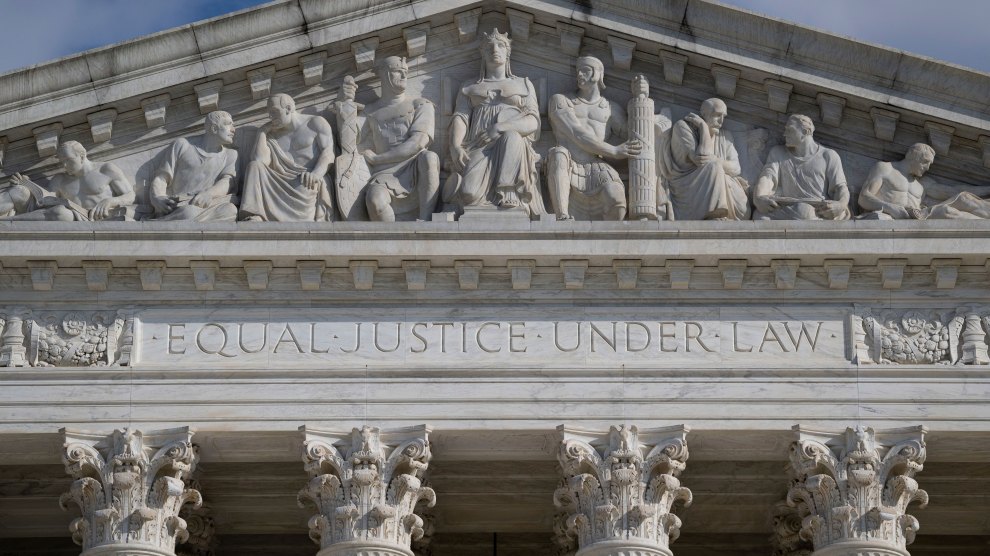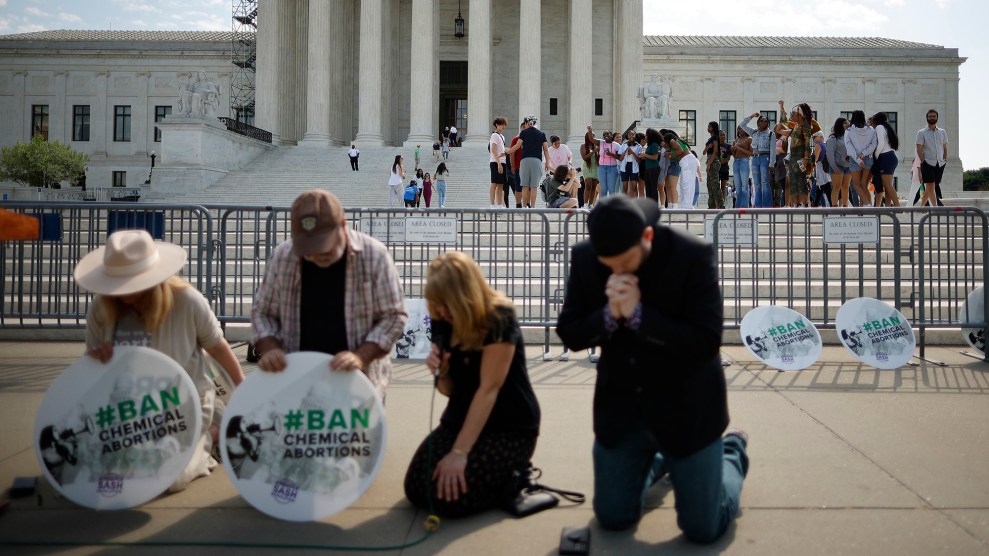
Graeme Sloan/SIPA USA/AP
This story was originally published by Inside Climate News as part of our Climate Desk collaboration.
The Supreme Court on Monday declined to hear five appeals from the fossil fuel industry seeking to move climate change lawsuits it faces to the federal courts. The decision opens the door for Baltimore and other cities, states and counties to pursue their claims for damages from climate-related extreme weather events, flooding and sea-level rise in state courts.
Since the localities began filing their climate suits six years ago, they have, for the most part, seen state courts as the appropriate, and more advantageous, jurisdiction for seeking damages caused by climate change using product liability, deceptive advertising and nuisance statutes.
They have contended that the industry has known for decades that burning fossil fuels produces greenhouse gases that warm the planet—harming local jurisdictions, their infrastructure and, ultimately, their citizens.
“Since we filed this case nearly five years ago, the climate crisis has worsened, the costs to Baltimore taxpayers are skyrocketing, and the defendants have pocketed trillions of dollars in profits while trying to dodge accountability for their deception,” Sara Gross, chief of the Affirmative Litigation Division in the Baltimore City Department of Law, said in a statement.
Oil and gas companies, on the other hand, have sought to move these cases to federal courts where the focus would be less on local damages caused by extreme weather and more on national issues related to energy needs and greenhouse gas emissions under the federal Clean Air Act. ExxonMobil, Chevron and Shell Oil Products were among the parties arguing that issues related to greenhouse gas emissions are “inherently federal.”
The lawsuits before the high court were filed by Rhode Island, the cities of Baltimore, Honolulu, and Imperial Beach, California, and counties in California and Hawaii. Numerous other states, cities and counties have filed similar suits. “After decades of climate change deception by the fossil fuel defendants, and now nearly half a decade of delay tactics in our lawsuit to hold them accountable for it, our residents, workers, businesses and taxpayers are ready for their day in court,” said Rhode Island Attorney General Peter F. Neronha.
The fossil fuel companies vowed to continue fighting the lawsuits, and pursuing their jurisdictional arguments. “We will continue to fight these suits, which are a waste of time and resources and do nothing to address climate change,” a spokesperson for ExxonMobil said. “Today’s decision has no impact on our focus to invest billions of dollars into leading the way in a thoughtful energy transition that takes the world to net zero carbon emissions.”
John Masslon, senior counsel at the Washington Legal Foundation, a conservative public law firm that filed an amicus brief on behalf of the fossil fuel industry, said the jurisdictional argument is far from decided. “The issue of whether climate change litigation belongs in state or federal court is not going away,” Masslon said. “The Supreme Court will eventually have to resolve the circuit split on this critical issue. Kicking the can down the road will just help pad the bank accounts of lawyers at consumers’ expense.”
To date, at least five federal circuit courts of appeals have considered the jurisdictional issue and concluded that there were insufficient grounds to move the cases from the state courts to federal jurisdiction.
In March, a brief filed by the Biden administration also urged the Court not to take up the appeals, arguing that no federal questions had been raised.
But fossil fuel companies argue there are still questions of law to be resolved, relying on a decision from the Second Circuit Court of Appeals that opponents contend is materially different from the five cases denied on Monday. The companies relying on that ruling argue that issues related to climate change are “beyond the limits of state tort law.”
Despite the high court’s decision, fossil fuel companies remain adamant that climate change should not be fought in courtrooms. Greenhouse gas emissions are a global issue that cannot be confined to a state’s borders, they argue. An oft-cited brief from the Obama administration argued that regulatory solutions are preferable to a never-ending series of lawsuits in courts around the country.
“This ongoing, coordinated campaign to wage meritless lawsuits against companies providing affordable, reliable and cleaner energy is nothing more than a distraction from these important issues,” said Ryan Meyers, senior vice president and general counsel at the American Petroleum Institute. “Climate policy is an issue for Congress to debate, not the court system.”
But for the localities seeking to recover damages for the impacts of climate change, the court’s decision on Monday moved them a step closer to having their arguments heard in the state courts.
“Communities across California experience the accelerating climate crisis every day, through extreme precipitation and floods, wildfire, impacts on public health and vital infrastructure, and more,” the cities of Santa Cruz and Richmond, and the counties of Marin, San Mateo, and Santa Cruz, said in a joint statement. “The defendants in our cases knew these catastrophic impacts were coming, and predicted it with precision, but they deceived and failed to warn consumers about it even as they carried on pocketing trillions of dollars in profits. They have exhausted their procedural delay tactics for this phase of the cases. It is time to prepare for trial.”
A separate appeal challenging lower court decisions in cases from New Jersey and Delaware is still pending before the Supreme Court and will be heard on May 11.








